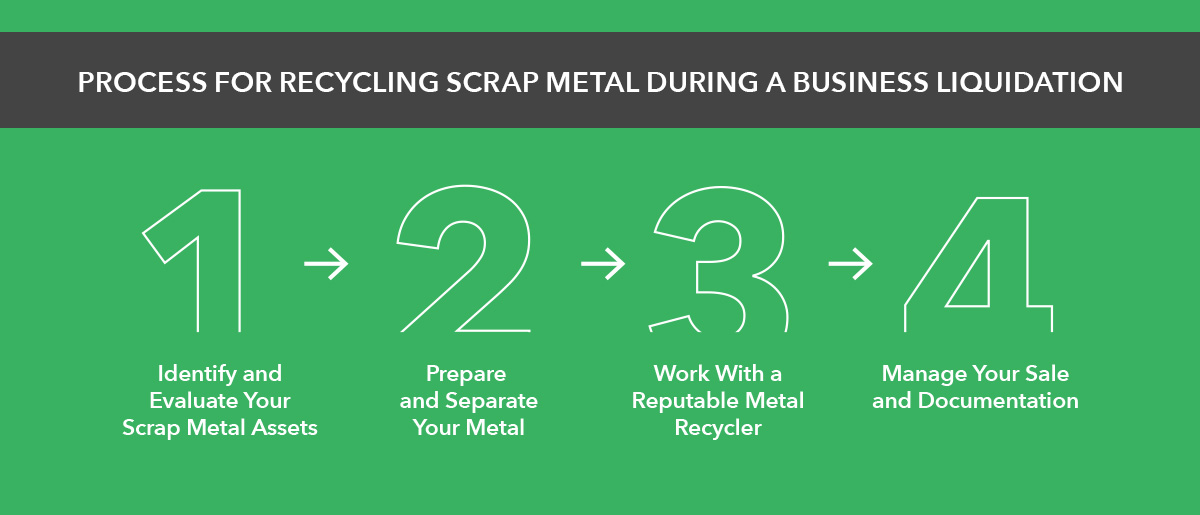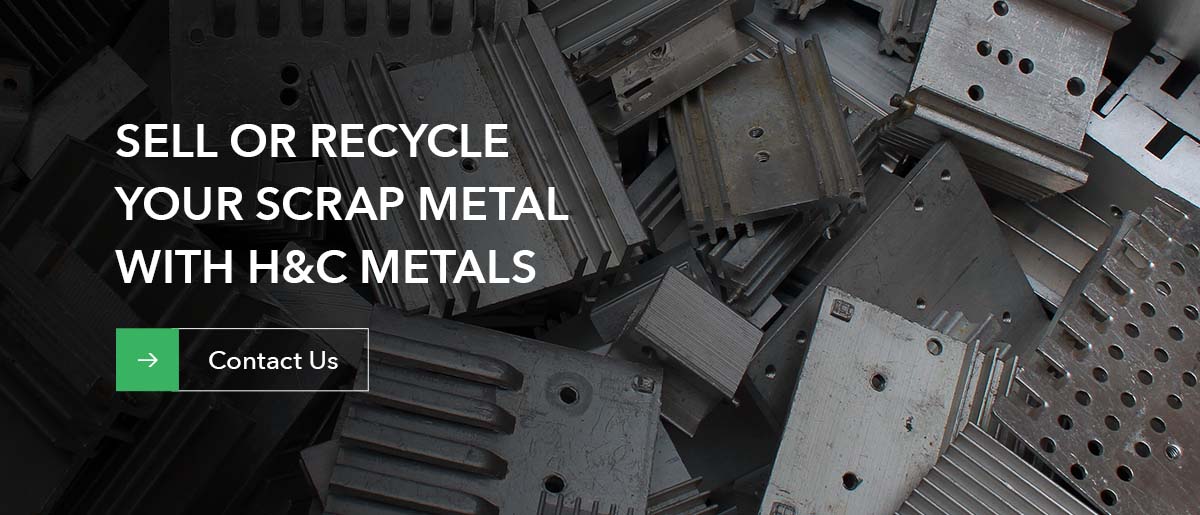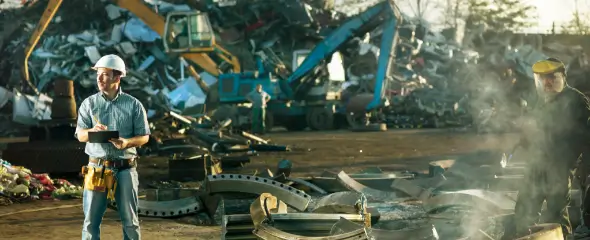Liquidation scrap metal recycling turns your company’s unwanted metal materials into an additional revenue stream while reducing your environmental impact. Following scrap metal recycling tips and working with a reputable recycler helps increase your return on investment (ROI) on the metal materials you are unable to sell, ensuring you get the greatest value from your scrap.
When to Choose Commercial Scrap Metal Recycling Over Selling
Industrial asset recovery is a great option when your metal still has significant market value, but scrap metal recycling is necessary if your material cannot be refurbished or reused. Opt for scrap metal recycling if any of the following factors apply:
- You have metal that is damaged.
- Your metal comes from an end-of-life product and is now obsolete.
- There is no viable resale market for your metal or the demand for your scrap metal is low.
- You have sensitive components.
- The net resale is lower than the cost to uninstall, test, package and ship your metal to buyers.
- Transport and site disruption processes are highly complex.
- The material’s valuable raw materials are unsuitable for reuse.
- You have aggressive deadlines or limited storage for scrap metal.
You can also take a hybrid approach to liquidation scrap metal recycling. If it’s financially beneficial, sell your high-value metal and scrap your remaining metal, setting reserve prices with your chosen recycler to ensure you get the best value possible. A reserve price is an established minimum acceptable price that you and your recycler agree on, preventing low-value sales in the event that your material’s market price drops unexpectedly.
Advantages of Liquidation Scrap Metal Recycling
Liquidation scrap metal recycling offers advantages such as:
- Revenue: Recycling your metal materials increases revenue and ROI during the liquidation process, helping you bring in more cash.
- Reduced costs: Scrap metal recycling helps you avoid or reduce landfill costs as you discard equipment, inventory, furniture and materials.
- Environmental impact: The fewer materials you send to the landfill, the lower your environmental impact is. You can help protect the environment by opting to recycle your materials.
What Is the Process for Recycling Scrap Metal During a Business Liquidation?
The following industrial scrap liquidation process can help you bring in more revenue from your company’s waste materials:

1. Identify and Evaluate Your Scrap Metal Assets
Identify your company’s available scrap metal, determining every potential metal source. You can look at your equipment, product inventory, furniture, racking and fixtures that you are unable to sell. You can use the following strategies to identify and sort your scrap metal:
- Differentiate between high-value and low-value metals: Magnetic or ferrous metal is low-value, while nonmagnetic or nonferrous metal is high-value. You can get a higher return on nonferrous metals such as brass, aluminum and copper. Use a magnet test to separate materials into low-value and high-value categories.
- Estimate the value of your metals: Estimate your scrap metal’s purity and volume, considering current market conditions. Larger quantities of uniform metal materials typically bring in a higher return.
- Estimate tonnage: Estimating your scrap metal’s tonnage helps you directly determine the value of your materials, ensuring transparency when you determine the market value.
2. Prepare and Separate Your Metal
Designating on-site containers and zones for your metal improves recycling efficiency. When you separate high-value and low-value metals, you can reduce double-handling and maximize the value of your materials. Use the following tips to prepare and separate your metal:
- Clean the metal: Remove nonmetal attachments, such as glass, rubber, insulation and plastic, from your metal to ensure your weight estimates are accurate. It’s also important to remove debris, such as rust, oils and dirt, with a degreaser or a wire brush.
- Sort metal by type and grade: Separate your metal into designated containers. For example, you might have a container for aluminum, one for steel and one for copper. It’s also important to separate different grades of metal, such as #2 copper and #1 copper.
- Disassemble large items: Break down large, complex equipment into components to ease transportation and increase the value of your materials.
- Remove cords from electronics and appliances: Remove and set aside power cords from the electronics or appliances you plan to sell. Insulated copper wiring is a valuable nonferrous metal. Use caution when handling electronics and appliances to protect yourself from potentially harmful materials.
3. Work With a Reputable Metal Recycler
Partner with a metal recycler that provides transparent, competitive pricing and convenient services. Before choosing a recycler, ensure you agree on container specifications, pricing formulas, points of contact and service windows. These tips can help you choose a reputable recycler:
- Obtain quotes: Request quotes and compare rates to ensure you get the best deal.
- Consider the logistics: Finding a recycling company that can deliver various-sized containers directly to your site makes the process more convenient and efficient.
- Ask about services and favorable terms: Inquire about weight verification processes, payment schedules and container pickup services. This is especially important if you plan to recycle larger loads.
4. Manage Your Sale and Documentation
Proper documentation ensures financial accuracy and legal compliance. Create a smooth process with the following steps:
- Follow state and local regulations: Check local, state and federal metal recycling laws to ensure all of your transactions meet regulations. This helps prevent theft.
- Create a comprehensive timeline: Create a detailed timeline for teardown, removals and recycler pickups.
- Verify weights: Check the recycling yard’s scale to ensure accurate weights.
- Use photo documentation and weight tickets: Simplify your grading and tagging process with photo documentation and weight tickets. Photo documentation protects involved parties with time-stamped, verifiable evidence of your metal materials. Weight tickets document your scrap metal’s weight and value, helping you maintain accurate inventory and financial records for compliance purposes.
- Track all transactions: Keep detailed records of your scrap metal sales to facilitate smooth accounting and tax reporting.
How to Maximize the Value of Your Scrap Metal
The following tips can help you maximize the value and ROI of your scrap metal:
- Use covered containers to keep your materials dry and clean.
- Consolidate and correctly size loads to minimize transport fees and access the best price tiers.
- Schedule your scrap metal pickups to match your sorting pace, prevent idle containers and avoid rush charges.
- Follow local and federal waste recycling laws to avoid potential fines.

Sell or Recycle Your Scrap Metal With H&C Metals
Liquidation scrap metal recycling is an excellent way to convert your company’s assets into cash, avoid landfill costs and reduce your environmental impact. H&C Metals is a family-owned scrap metal buyer and recycler you can trust.
As a company with almost 50 years of experience and an NJDEP-approved handler of electronic scrap, you can depend on us to meet your commercial scrap metal recycling needs in Newark and its surrounding areas. We go out of our way to accommodate our customers, and our team is dedicated to helping you get the most value from your scrap metal. Contact us to learn more about our recycling services and how we can assist you in your liquidation process.


